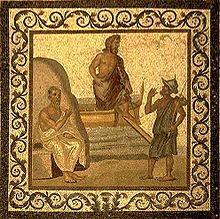The Oath of Hippocrates is still taken today by a physician-to-be, yet not everybody knows that this goes back to the very man who lived in the days of Pericles (5th century BC) and earned the recognition as Father of Western Medicine.
It seems probable that the Hippocratic Oath appeared only after Hippocrates’ death. This oath was actually a religious document established to make sure that a doctor operated within and for the community's values. The oath was sworn by Apollo, Hygeia, and Panacea, promising to respect their teacher, not to administer poison or abuse their patients; and, quite importantly, they swore to keep the confidentiality between doctor and patient – how modern that is! No wonder today’s Hippocratic Oath is formulated along the same line!
An image of Hippocrates on the floor of the Asclepieion of Kos, with Asklepius in the middle.
Hippocrates of Cos was probably born around 460 BC to become the most famous physician in antiquity, and his great merit is that he “untied” the link with the famous Greek god of healing, Asclepius. Sickness and health were no longer in the hands of the gods but were the result of our living habits, our nutrition, and our environment.
Nothing much has been documented about Hippocrates from his days, and all we have are patchy references written down at a later date. The oldest such document is from the 1st/2nd century AD by the Ephesian physician Soranus, who informs us that Hippocrates traveled extensively throughout his life and died in Larissa around 370 BC. He tells us that Hippocrates acquired his knowledge from his father and Herodicus of Selymbria, a gymnastic trainer. He frequented several sophists of his time, and Plato has it that Hippocrates worked for a fee (just like in our modern world) and basically treated the entire body of his patients. Other ancient sources seem to confirm that Hippocrates believed in a good diet and in exercises to keep the body healthy.
It has been documented, for instance, that he successfully fought the plague that ravaged Athens in 430 BC by lighting fires throughout the city. He also established that King Perdiccas II of Macedonia, a distant ancestor of Alexander the Great, was love-sick and did not suffer from any other obscure ailment.
Unfortunately, his many treatises, speeches, and letters on medicine have not survived, but they were still available at the Library of Alexandria during the reign of the Ptolemies. This Hippocratic Corpus, as it was called, was divided into four separate categories: the diagnosis, biology, treatment of the patient, and a piece of general advice for the doctors. It seems that at least sixty treatises existed, each one focusing on a specific subject: therapy, surgery, physiology, gynecology, the evolution of the disease, and the purging remedies, to name only a few. He even discussed the interaction of medicine with other subjects, like philosophy. Several ancient physicians are known to have written commentaries on his treatises, among which we can name Apollonius of Citium (1st century BC) and the famous Galen (2nd/3rd century AD).
At least we have inherited his school of medicine on the Greek island of Cos, better known as the Asclepion (rather paradoxically), of which important foundations can still be seen today. Hippocrates had three sons who all walked in his footsteps: Thessalus, Dracon, and Polybus.
How about Alexander’s medical knowledge? It is generally accepted that he received some teaching from Aristotle on the subject, but he may well have had direct access to Hippocrates’ treatises, as they were written only one hundred years earlier.

No comments:
Post a Comment